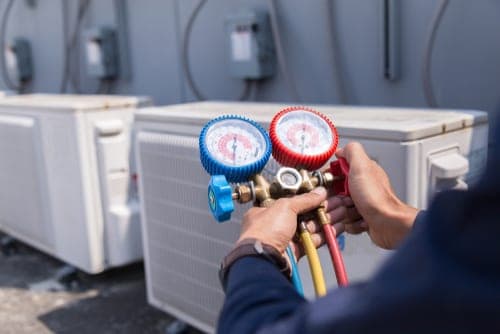Schedule a Maintenance Visit Today with DMAKS HVAC Experts.
Energy-Efficient A/c Equipments to Minimize Energy Costs
As power costs continue to increase, the importance of energy-efficient cooling and heating systems comes to be progressively apparent. These systems not only guarantee considerable financial savings on utility costs but likewise add to a more lasting future by lessening power usage. With different alternatives readily available, consisting of geothermal warm pumps and ductless mini-splits, homeowner deal with a wide range of choices that can boost convenience and air quality. Recognizing the essential features and upkeep demands is vital to making the most of these advantages. What aspects should be focused on when choosing the right system for your requirements?
Benefits of Energy-Efficient Cooling And Heating Systems
Energy-efficient Heating and cooling systems offer numerous benefits that extend beyond plain cost financial savings. By eating less power, these systems add to decrease greenhouse gas emissions, assisting to deal with climate modification and promote sustainability.
Additionally, energy-efficient a/c systems usually supply boosted comfort degrees. Most of these systems include innovative technology that enables far better temperature level control and boosted air top quality (DMAKS HVAC). This brings about a much healthier interior atmosphere, which is specifically crucial for individuals with allergies or breathing problems
Furthermore, spending in energy-efficient HVAC systems can improve property worth. As more consumers focus on power effectiveness, homes and structures furnished with these systems may draw in higher quotes in the actual estate market.
Sorts Of Energy-Efficient Heating And Cooling Options
How can home owners and services pick one of the most appropriate energy-efficient HVAC alternatives for their requirements? The marketplace supplies a variety of energy-efficient HVAC systems, each designed to boost comfort while decreasing power consumption.
One alternative is the variable refrigerant circulation (VRF) system, which successfully controls the temperature level in numerous areas within a building. This system adapts its refrigerant flow to match the desired temperature level, bring about significant power financial savings.
One more popular option is geothermal heat pumps, which utilize the earth's secure temperature to heat and trendy spaces. By moving warm to and from the ground, these systems demonstrate remarkable efficiency, specifically in moderate environments.
In addition, ductless mini-split systems supply an energy-efficient option for homes doing not have ductwork. These systems permit zone-specific heating and cooling, decreasing power waste in vacant locations.
Last but not least, high-efficiency furnaces and a/c unit, with advanced SEER and AFUE rankings, use reputable environment control while taking in less power than standard models. By evaluating these options, home owners and businesses can select a heating and cooling system customized to their particular needs and energy efficiency goals.
Secret Functions to Take Into Consideration

Next, examine the type of compressor utilized in the system. DMAKS HVAC. Variable-speed compressors can change their outcome to match the home heating or cooling need, leading to enhanced comfort and energy cost savings contrasted to single-speed models. In addition, search for systems furnished with click to read smart thermostats that supply programmable setups and remote accessibility, permitting far better control over power consumption
One more critical function is the system's air filtration ability. High-efficiency filters can enhance indoor air high quality and lower power intake by making certain the system operates successfully. Moreover, consider the sort of cooling agent used; contemporary systems commonly use environment-friendly refrigerants that have a lower environmental influence.
Lastly, make certain that the system is compatible with zoning technology, which permits tailored temperature control in various locations of your home, improving comfort while minimizing power usage.
Tips for Choosing the Right System

Following, consider power effectiveness rankings, specifically the Seasonal Power Performance Ratio (SEER) for cooling down systems and the Annual Fuel Use Efficiency (AFUE) for heater. Higher scores show better performance, which can result in considerable cost savings on energy bills in time.
Additionally, evaluate the type of HVAC system that best suits your way of living and spending plan. Alternatives include air conditioning, ductless mini-splits, and heatpump, each with its very own collection of advantages and drawbacks.
Don't neglect the relevance of appropriate setup and sizing; an improperly sized system can bring about inadequacies and increased wear. Consult with an expert A/c specialist to get experienced suggestions tailored to your home's one-of-a-kind requirements. This detailed approach will certainly ensure that you choose an energy-efficient cooling and heating system that meets your requirements and budget properly.
Maintenance for Optimum Efficiency
When the appropriate cooling and heating system great post to read is in location, recurring upkeep becomes crucial to guaranteeing ideal effectiveness and long life. A well-maintained system operates more successfully, resulting in reduced energy intake and decreased utility costs. Regular inspections and tune-ups need to be set up at the very least twice a year-- as soon as prior to the air conditioning season and once before the home heating season.

Property owners should also be alert about checking their a/c system's performance. Uncommon noises, changing temperature levels, or raised power costs can show underlying issues that call for prompt interest. By resolving these worries quickly, house owners can protect against costly repair work and prolong the lifespan of their systems.
Investing in an upkeep strategy with a certified professional not just boosts efficiency but additionally provides assurance, recognizing that the system is operating at its ideal. DMAKS HVAC. Regular maintenance is for that reason vital for maintaining power efficiency and decreasing overall operational expenses
Final Thought
To conclude, energy-efficient cooling and heating systems offer a viable option for lowering utility costs while boosting convenience and air quality. By incorporating advanced modern technologies and options such as geothermal heatpump and ductless mini-splits, residential or commercial property proprietors can attain significant power cost savings and add to ecological sustainability. Careful consideration of system functions and ongoing maintenance additionally guarantees optimal performance, making energy-efficient systems a sensible financial investment for both economic and environmental advantages.